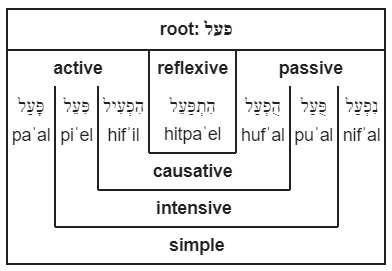Troublesome Topic: STUDYING THE HEBREW OLD TESTAMENT
Lesson 2 of 6HEBREW VERBS
The verbs in Hebrew are very different than those in most languages we are familiar with. They don’t really have tenses as we think of them, rather the grammatical terms like Perfect and Imperfect refer to the state of completion of the action regardless of time. Perfect means completed action (in the past, present or future as determined by context). Imperfect indicates action in an incomplete state, in any time frame.
The truly important part of the Hebrew verbs are categories we call the seven stems.
They are the following:
The first three stems are active – the subject of the sentence is the one doing the action.
Qal (also Kal or Paal) Simple action = “He wrote.”
Piel Intensified action = “He engraved.”
Hiphil Causative action, he is not doing the action but causing someone else to do it = “He dictated.”
Hithpael This stem is both active and passive, (called reflexive). He does the action and he receives the action. = “He corresponded back and forth.”
The last three stems mirror the first three stems except that they are passive action, the subject of the sentence is receiving the action, not doing it.
Hophal (Huphal) Causitive passive = “the letter was dictated
Pual Intensified passive, = “The stone was engraved.”
Niphal Simple action (like the Qal) but passive = “The letter was written.”
I find the following chart from https://en.wikipedia.org/wiki/Modern_Hebrew_verbs to be helpful.

HEBREW NOUNS
Hebrew Nouns have two primary forms, Absolute and Construct. The Absolute form is everything except the idea of possession, which is covered by the Construct form, which only covers possession (expressed in English by prepositions such as “of and by”. Therefore, do not be surprised to see lexica or commentaries frequently use the word “absolutely” in a way that sounds strange to our ears. They are using it grammatically, not in a normal sense.
Nouns also have gender and number, including not only a singular and plural forms, but also a dual form.
HEBREW RELIES A GREAT DEAL ON CONTEXT
The Hebrew language is very picturesque and poetic, but not highly precise (while Greek is usually precise). In Hebrew there are many words that are left out of the text (sometimes it is the primary verb or the subject of the sentence), and many things that are not made clear. There are also many words that have a wide range of meanings. These are all left to context to determine what meaning was intended. So pay close attention to the immediate context, the context of the passage, and the context of the book as a whole.